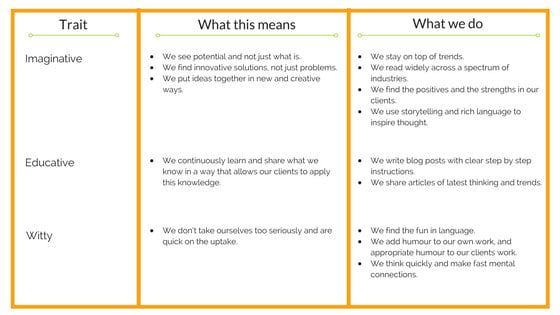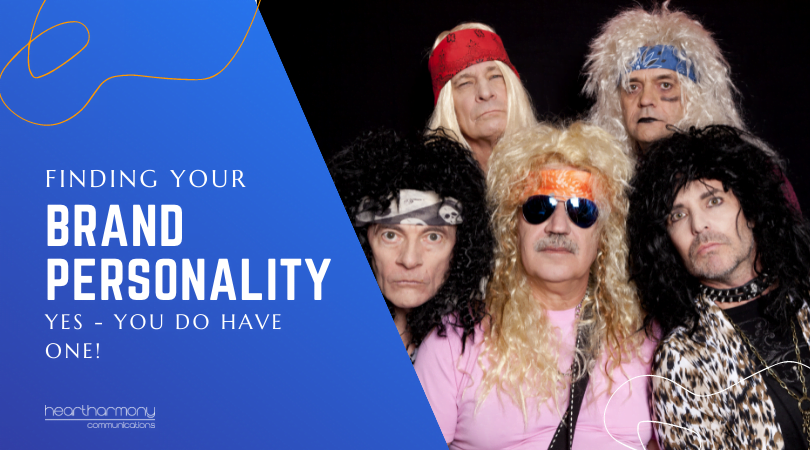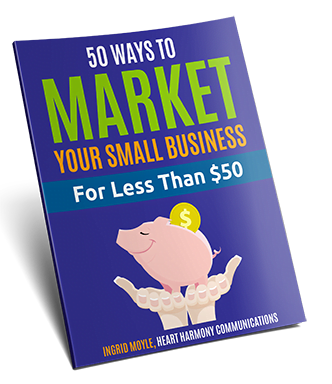Your brand can also be called your business personality. This article shares the easy way to work out your brand personality & apply it across your business.
“Gee they’ve got a great personality!”
When you first meet someone and get that magical “click” with them, often the first thing that you comment about is their personality. Yes, you may go on to rave about their looks or something funny that they said, but your first comment is about their personality.
Every business also has a personality (also known as your brand or brand personality). People look at your business and are either attracted to the business personality or repelled by it. It’s what makes people want to find out more about what you offer and helps make people want to connect with you.
If you have the business equivalent of a great personality, then your business is heading down the fast track to a happy bank balance.
How do we work out personality?
So, is your business personality currently one that magnetically attracts people like Betty White handing out cupcakes, or is your business personality the equivalent of a malevolent Goth who quietly sits sharpening their knife at a church garage sale?
How do you know? You use the same tests as you do with regular human interaction.
While we would all love to sit new people down and administer a barrage of psychological tests before talking with them (… or is this just me), in real life we take mental shortcuts to make decisions about someone’s personality. (And yes, we go through this type of brand assessment process when we work with any new clients.)
It all starts with looks
 Our first glance at someone new takes in what they are wearing. What you wear is a reflection of your personality and how you feel. You can attract people or push people away by what you choose to wear.
Our first glance at someone new takes in what they are wearing. What you wear is a reflection of your personality and how you feel. You can attract people or push people away by what you choose to wear.
Do you ever look in awe at Queen Lee Lin Chin’s asymmetrical outfits, or the latest Hollywood starlet who forgets to wear underwear beneath their scraps of fabric masquerading as a frock and think “Looks great on her, but I wouldn’t be caught dead in that!”
Do you ever wonder why we snigger at brawny footy blokes in tutus or smile at kids in suits that don’t fit? Do you ever look in your cupboard and realise you haven’t worn an outfit for a few years simply because it isn’t you anymore?
Have you been given a piece of clothing by someone because they think you would look great in it, and then feel like you have to wear it simply because they spent money on it (even though you hate it?)
You can always tell when someone is wearing clothes that don’t match with their personality: They just look just a tad bit … awkward.
Although the clothes may physically fit, something just doesn’t seem right, and we silently carry a sense of distrust about the person, or if the disconnect is exaggerated, we laugh at the absurdity of them.
That’s why we guffaw when we see footy blokes in tutus, and tug at the neckline of dresses that are just not us. That’s why man-child comedians (e.g. Frank Woodley) wear suits that are ill-fitting and always too short at the wrists and legs, and that’s why we judge anyone uncomfortably wearing less than a postage stamp.
The logo and colours you choose for your business are like the clothes you wear. They are the bits of your business personality you show to the world each day. They may fit, or you may outgrow them. They may be a good match, or they may look better on someone else.
If you look at your logo or colours and feel that you want to pull at them in the same way you would a wedgie, it means you have outgrown it, moved on or someone gave it to you, and you were too polite to refuse. It’s time to go get a logo makeover!
What you say and how you say it
“They looked like they were a really nice guy until they opened their mouth.”
Once people have taken in your looks, they listen to your words and your voice to make their split-second judgement call. Our inbuilt mental personality tests put the looks and the voice/words together to make a decision about how nice or not a person is.
The words you use, the way you put them together and the tone of your voice are also key parts of your personality. We have all met people who looked nice on the outside, but they had a voice that didn’t match how they looked, or who were poisonous in the words they spoke.
Your voice should be distinctive and be able to be recognised with or without an accompanying picture. You can instantly pick the dulcet soothing tones of Morgan Freeman’s voice or the quavery nasal cries of Pauline Hanson’s voice without seeing pictures of them.
The same is true for your business. The words you use and how you use them need to be distinctive and match your business personality or brand with or without your colours or logos.
Think about Virgin’s business personality: Cheeky, taking a poke at the establishment and very fresh. When they write ads or brochures each part of their writing reflects their overall brand. The words they use are fun, not stuffy and say it like it is.
When there’s a mismatch between your business personality and the words you use, that’s when distrust kicks in (or laughter at the ridiculousness).
There are many common copywriting mistakes small business owers make. Many small businesses make the mistake of trying to be too formal with their writing. They use big words, formal sentence structures and refer to themselves in the third person. That is the worst thing small business can do for their marketing as it screams a mismatch and makes people query if you are who you say you are.
Hearing Noni Hazelhurst read “Go the F to Sleep” is funny simply because of the disconnect between her brand voice (a gentle pre-school holier than thou TV educator that read nice books to a generation of kids) and the content she is reading.
Swear alert! If you are offended by the “F” word, DON’T watch this video!
Why is knowing your business personality important?
If all businesses have a personality, why do you need to know what it is?
Articulating your business personality helps you:
- Build your brand. Your brand personality creates a checklist against which you measure every piece of your brand collateral including your logos, colours, websites, brochures, emails, etc.
- Work out who to hire. You want people who match and not clash with your brand personality.
- Work out which suppliers to use. You need suppliers that understand your brand personality and help you deliver on your promises.
- Attract the right customers. Your A class clients always are ones that resonate with your brand personality. Your D class clients are always a mismatch.
The hard way to define your business personality
Ideally, you want to create a clear list of no more than 10 words that describe the personality of your business.
Personalities reflect inbuilt traits, attitudes or approaches. The words that you use to describe these traits or approaches should trigger emotions and get nods of understanding of what you mean.
One way people suggest you define your business personality is to gather all of the marketing material, blog posts, print collateral, business cards, and emails that you have used in the past week. Spread them out across your desk and then describe what you see.
It’s relatively easy to look at your logo and describe the personality of the logo (even if sometimes it can feel like you are trying to describe the flavours in a sip of wine without sounding like a pretentious git.)
However, if you read some of the blog posts or emails you have written, it can be much harder to describe the personality prowling beneath the words. You know you have one, but describing it can be like a bloke in a paint store trying to choose between beige and beige.
The simple way to define your business personality
The simplest way to define your business personality is to ask other people to define it for you.
In a small business, the personality of the business owner is interchangeable with the personality of the business. You are your business, and every part of you flows through your business.
The simplest way to define your business personality is to ask close friends and clients to describe your personality in no more than three words.
It makes it easier for them to think about it as if they were writing a dating profile for you and they have reached the part that asks for three words to describe your personality.
To define your business personality ask close friends to describe your personality in no more than 3 words as if they were writing
for a dating profile.
Then look for common words and themes in the words that they share with you.
Our test run – My personality
We tested this strategy on my personal Facebook page, and some of the words that were shared on the page and via direct messages were:
- Imaginative
- Educative
- Witty
- Vibrant
- Ethical
- Generous
- Quirky
- Compassionate
While there were more, these are a darn good representation of how we would like Heart Harmony Communication’s business personality to be defined and seen.
Grounding Your Traits
Once you have a list of personality traits, your task is to make them tangible for you, your team and your suppliers. You need to ground them with what the word means for you, and what actions or style you use in your business that reflects that trait.
The simplest way to do this is through a table. Here’s an example of what just three of these words mapped out would look like for our business.

Applying our business personality during recruitment
Once you know your brand personality and what it means, recruiting for vacancies is a heck of a lot easier. We look for candidates who are quick thinkers, future focused, who can find creative solutions to problems and who have a rich grasp of language but can still convert this into easily understandable information for our clients.
Applying our brand personality to suppliers
Suppliers can make or break your business. In our case, this means we only work with IT hosting companies, printers, graphic designers, etc. who are imaginative, solutions focused, creative and are happy to work with us to exchange knowledge and have a laugh together. They have to be ethical with us, their staff, their other clients and their own suppliers.
Want to attract A class clients? The words are a reflection of their personalities
There’s an interesting strand of thinking in psychology that says that we most hate in others what we hate about ourselves. The corollary is that what we most love about others is what we love about ourselves.
Looking through the wonderful, uplifting list of my personality traits shared by dearest friends and colleagues, I couldn’t help but smile as I saw them share some of their own greatest personality traits and place them lovingly around my shoulders as if they were mine alone.
The words that they chose were theirs. These were their strengths and their wonderful personalities. Yes, they saw these traits reflected in me – but the words could just as easily be used by me in describing them.
That is why being clear on your business personality and reflecting it in everything that you do will attract the clients that you really want to work with. Like attracts like.
If we put our words into a client checklist, our A class clients are imaginative and willing to see possibilities. They have a sense of humour and are ethical in all their dealings with us and their clients. They are happy to help us understand their business and their industry. They are generous and willing to trust our advice.
Our D class clients have no sense of humour, don’t respect us our time or our advice and expect us to already know every minute detail about their industry. They are unethical with their staff and clients (and pay us late or not at all). They only see problems, and focus only on what is and not what could be.
Putting it all together
Your core traits are the foundation of your brand personality. This personality permeates everything that you do, and every action that you take.
Your brand personality needs to be congruent across your logo, colours and the words that you use otherwise people will distrust you, or quietly laugh at you, but not buy from you.
Ultimately, those businesses with the best personalities are the ones that succeed. That’s why knowing what your brand personality is, is so important to your business.





